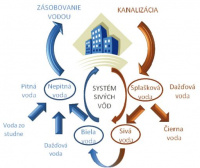Utility water
Utility water is water that is always produced from potable water, either by heating (warm water), while there are no safety and quality limits for warm water, as is the case with drinking water. Standard STN 83 0616 defines warm water as water that is not harmful to health, but is not intended for drinking or cooking! It is necessary to know that domestic hot water is not subject to any standards, no legal regulation establishes exact requirements for its quality, and it is not subject to regular inspections. And in addition, due to its temperature, it is more susceptible to the appearance of bacteria. Domestic hot water can only be produced from potable water. The relevant public health authority decides on the possibilities of its use.
Useful water can be produced further by purifying gray wastewater (wastewater from bathrooms, showers, bathtubs, sinks, washing machines, dishwashers, waste crushers). After purification, it turns into useful water (also referred to as white water).
Service water can be, in addition to the mentioned hot water, also:
Industrial water – is service water used in industrial plants for processing raw materials or in the production of products, as a rule, individual plants themselves prepare it, recycle it and store it in reservoirs or reservoirs.
Technological water – is useful water that is part of the production process of the given product.
Irrigation water - is surface water for irrigation purposes classified as utility water.
Use of commercial water
1. Flushing
Flushing the toilet with clean, potable water is one of the biggest sins of modern society. Pouring an average of 8 liters of water down the toilet for one use (when in some countries they don't even have the 3 liters that a person should drink daily) is an unnecessary waste of a precious resource.
Commercial water is abundantly sufficient for flushing.
2. Irrigation
Ornamental rock gardens, fruit orchards, vegetable gardens. All plants need (especially in summer) watering. Collected rainwater will be used if there hasn't been a cloud in the sky for several days. Plants willingly drink even "non-potable" water.
3. Washing (anything)
Car, dirty tools, floor, bathtub. 90% of the things in our household can withstand even rainwater during washing. However, it is better to leave the windows, mirrors, dishes and teeth in the hands of drinking water.
4. Showering
Rainwater is soft, contains fewer minerals and can also be suitable for washing hair. However, in order to be able to use water for such "sensitive" matters, you will also need a reliable filter.
5. Heating
A similar case as in the previous point. After a consultation with a technician and a minor adjustment, nothing should prevent you from letting the service water into the radiators.
6. Feeding animals
Whether you give your pets water to drink or cook them dinner, you should not harm them in any way. Animals are also used to drinking from puddles, and with a large number of animals, you save hundreds of liters of water per month.
7. Swimming pool
If you have a pump with a good filter, fill the pool with commercial water this summer. After the season (or when changing the water during the season), you can use the water again - for example for washing. Just watch out for the amount of chlorine, which could corrode the surface of the things being cleaned.
8. Cooling
In the summer, more and more often the so-called cooling showers, gates or sprayers. When you get wet, rainwater won't hurt you. This will not happen even if you come into contact with it during a hot day on a concrete area.
9. Construction work
Do you brick? Do you earn mortar, concrete? The result of your Masonry skills will not change in any way when you use utility water.
10. Washing
Similar to points 4 and 5, this activity is conditioned by the composition of the water. However, after consulting the washing machine manufacturer and installing a suitable filter, it is also suitable for cleaning our clothes.
important Notice
Do not be afraid to invest in a quality filter, thanks to which you can use the water for many activities. Before using it, request a chemical analysis from an expert who will approve its use. The roof and the surface of the container into which the water drains also play an important role in rainwater harvesting.
Some materials are not suitable for capturing and further handling water. When using such water, long-term storage is not recommended - there is a risk of the spread of dangerous microorganisms. To minimize this risk, place the holding tank, for example, underground, where the temperature is lower.

